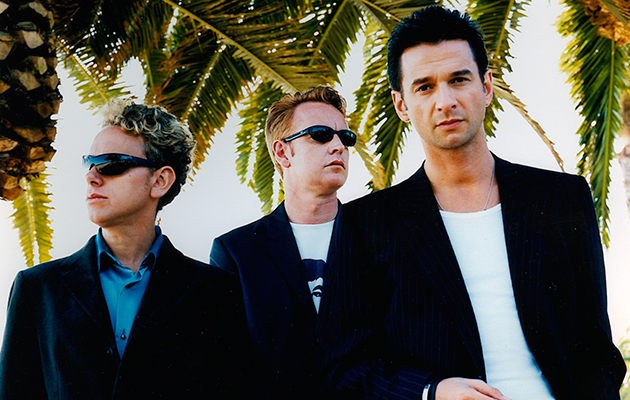“People who romanticise the booze and drugs lifestyle should try living it,” says Martin Gore. Here, Basildon’s kings of electro-sleaze seem reinvigorated as they discuss 30 years of highs, lows and landmark LPs, and look forward to the release of a new one. “It’s a good time to be in this...
MUSIC FOR THE MASSES
MUTE, 1987
Despite a lack of hits, this fine collection of moody travelogues made the band stadium-filling stars of America’s growing alt.rock scene. The accompanying tour was filmed by DA Pennebaker as 101.
GORE: The first LP without Daniel [Miller]. Relations were getting strained. All of us needed a breath of fresh air. Daniel was getting more successful as a label boss and didn’t really have time to work with us.
FLETCHER: The quality of the album was really high. “Never Let Me Down Again” is one of our live classics, and “Strangelove” became a big dance hit.
GORE: This and Black Celebration [1986] were turning points for us. This was when we hooked up with Anton Corbijn, who made our look more cohesive. And he’s beenwith us ever since, so there must have been something cool about those albums.
FLETCHER: The tour was very famous – that was when we did the Rosebowl gig in Pasadena. One of the problems we’ve always had with Britain is our so-called dodgy past, but America never got that. They thought it was quite quaint. Punk had passed them by, and they had this horrible music at the time. This was the first time Americans were listening to music that wasn’t Journey or Aerosmith.
________________________
VIOLATOR
MUTE, 1990
A sleek, hit-packed masterpiece that transformed Depeche Mode into global superstars. Still their biggest seller…
GAHAN: It’s a cliché but the team you have around you when you’re making a record is really important. We had Flood and [mixing producer] François Kevorkian, the cutting-edge New York DJ, and he brought some of that in the polish and detail. Added to Flood’s grit and dirt, it was a really great combination. I think there’s some of that same spirit in this new record [Sounds Of The Universe] because [producer] Ben Hillier is the same school as Flood. It’s about getting some grit and energy down.
FLETCHER: I wasn’t sure about “Personal Jesus”. We put that single out six months beforehand and it was big risk, but it did amazingly well. Then we had “Enjoy The Silence”, which we pretty much knew was a massive hit. There are not many tracks you know will be massive, but that was one of them…
GAHAN: I did feel it with “Enjoy The Silence”. When that song was originally recorded it was kind of a piano ballad, but Alan [Wilder] and Flood wanted to play around with the song, put a rhythm to it. Martin was not into it at first. We were recording in Denmark and Alan said: “Just give us two days to fuck around with this.” I think Alan wrote the bassline, then Flood asked Martin put down some guitar on it. Martin picked up his guitar and played that beautiful melody, like, immediately. It was classic Martin.
GORE: At that time in America we were very hot. We did an in-store appearance at the Wherehouse in LA and the riot police were called in. We got on national TV. You can’t pay for better publicity than that. Suddenly overnight our name was heard all over America.
GAHAN: 20,000 people turned up to see us. I remember going back to the hotel that night, and we were on every news channel. By the end of that month the album had sold a couple of million copies in America. It was insane.
GORE: That was the last of our huge output, back- to-back albums. After the success of Violator I think we just felt we needed time to regroup to make sure the quality of the next album was really good, because you really felt the world was watching you at that point.
GAHAN: It was the beginning of the end for us, for a little while. That’s when the money started coming in. Until that point, we had gone from one record to another. People think because you’re a rock star you’ve immediately got millions in the bank, but that was not the case. It was that album where the royalty cheques suddenly made you think: Jesus Christ, I’ll go and buy a fucking house now! I don’t think we were prepared for the kind of attention that record got, which is probably why we went and made Songs Of Faith and Devotion. A very different album…



